Boardman J., Hammond N.G. L. The Cambridge Ancient History Volume 3, Part 3: The Expansion of the Greek World, Eighth to Sixth Centuries BC
Подождите немного. Документ загружается.

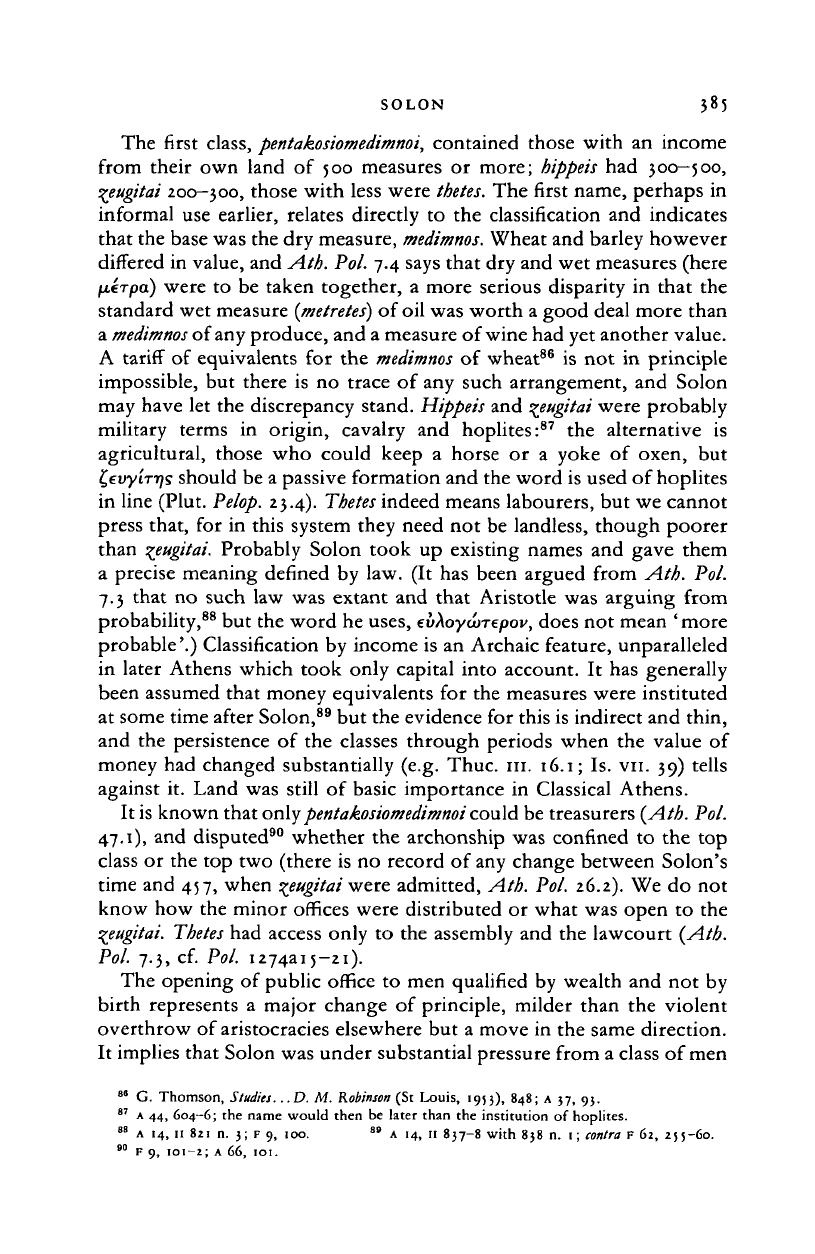
SOLON 385
The first class,
pentakosiomedimnoi,
contained those with an income
from their own land of 500 measures or more;
hippeis
had 300—500,
%eugitai
200—300, those with less were
thetes.
The first name, perhaps in
informal use earlier, relates directly to the classification and indicates
that the base was the dry measure,
medimnos.
Wheat and barley however
differed in value, and Ath. Pol. 7.4 says that dry and wet measures (here
fxerpa)
were to be taken together, a more serious disparity in that the
standard wet measure
(metretes)
of oil was worth a good deal more than
a
medimnos
of any produce, and a measure of wine had yet another value.
A tariff of equivalents for the
medimnos
of wheat
86
is not in principle
impossible, but there is no trace of any such arrangement, and Solon
may have let the discrepancy stand.
Hippeis
and
^eugitai
were probably
military terms in origin, cavalry and hoplites:
87
the alternative is
agricultural, those who could keep a horse or a yoke of oxen, but
{.evyirqs
should be a passive formation and the word is used of hoplites
in line (Plut.
Pelop.
23.4).
Thetes
indeed means labourers, but we cannot
press that, for in this system they need not be landless, though poorer
than
^eugitai.
Probably Solon took up existing names and gave them
a precise meaning defined by law. (It has been argued from Ath. Pol.
7.3 that no such law was extant and that Aristotle was arguing from
probability,
88
but the word he uses,
evXoywrepov,
does not mean ' more
probable'.) Classification by income is an Archaic feature, unparalleled
in later Athens which took only capital into account. It has generally
been assumed that money equivalents for the measures were instituted
at some time after Solon,
89
but the evidence for this is indirect and thin,
and the persistence of the classes through periods when the value of
money had changed substantially (e.g. Thuc. in. 16.1; Is. vn. 39) tells
against it. Land was still of basic importance in Classical Athens.
It is known that only
pentakosiomedimnoi
could be treasurers {Ath. Pol.
47.1),
and disputed
90
whether the archonship was confined to the top
class or the top two (there is no record of any change between Solon's
time and 457, when
^eugitai
were admitted, Ath. Pol. 26.2). We do not
know how the minor offices were distributed or what was open to the
^eugitai.
Thetes
had access only to the assembly and the lawcourt {Ath.
Pol. 7.3, cf. Pol. 1274a
15-21).
The opening of public office to men qualified by wealth and not by
birth represents a major change of principle, milder than the violent
overthrow of aristocracies elsewhere but a move in the same direction.
It implies that Solon was under substantial pressure from a class of men
88
G.
Thomson,
Studies.
..D. M.
Robinson
(St
Louis, 19)3).
848; A 37, 93.
87
A 44,
604-6;
the
name would then
be
later than
the
institution
of
hoplites.
88
A 14, 11 821 n. 3; F 9, 100.
88
A 14, 11
837-8 with
838 n. 1;
contra
F 62,
255-60.
90
F 9, 101-2; A 66, 101.
Cambridge Histories Online © Cambridge University Press, 2008
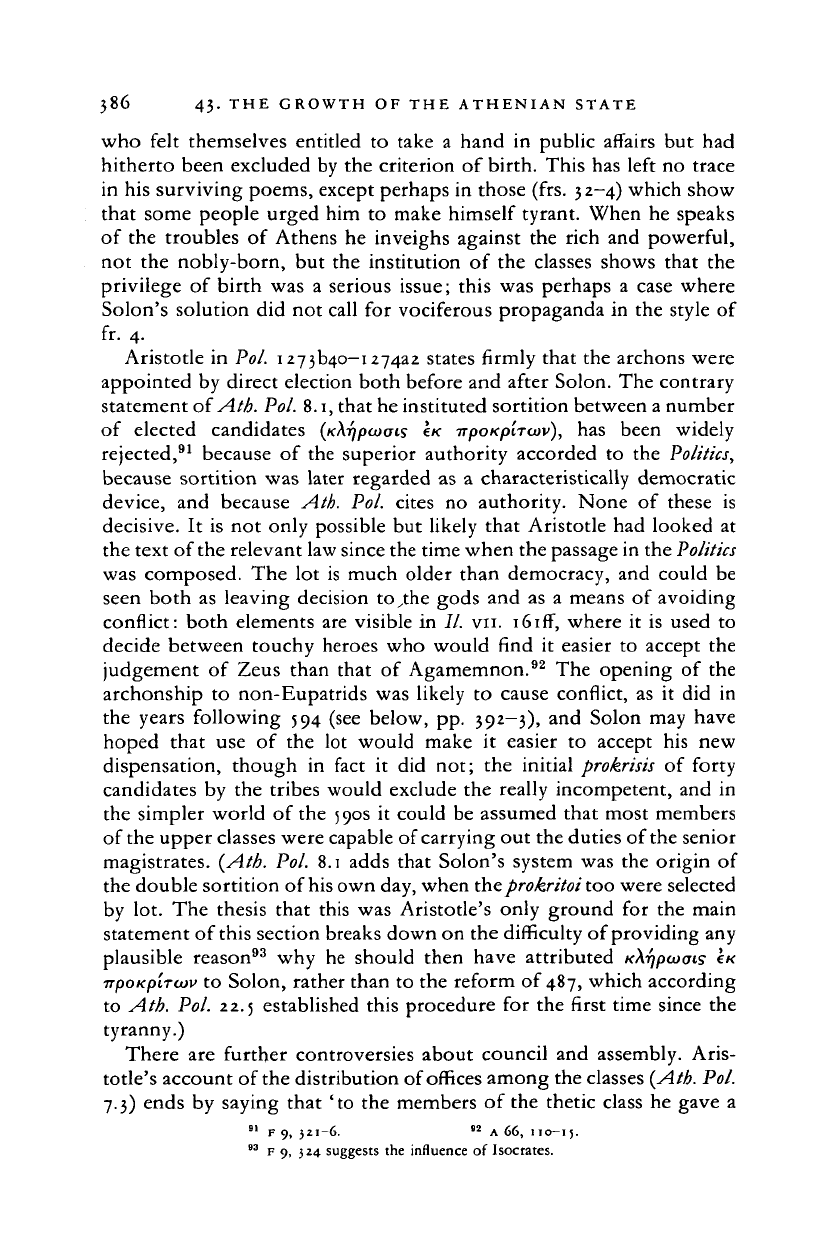
386 43- THE GROWTH OF THE ATHENIAN STATE
who felt themselves entitled
to
take
a
hand
in
public affairs but had
hitherto been excluded by the criterion of birth. This has left no trace
in his surviving poems, except perhaps in those (frs. 32—4) which show
that some people urged him
to
make himself tyrant. When he speaks
of the troubles
of
Athens he inveighs against the rich and powerful,
not the nobly-born, but the institution
of
the classes shows that the
privilege
of
birth was
a
serious issue; this was perhaps
a
case where
Solon's solution did not call for vociferous propaganda in the style of
fr.
4.
Aristotle in Pol. 12731340—127432 states firmly that the archons were
appointed by direct election both before and after Solon. The contrary
statement of Ath.
Pol.
8.1,
that he instituted sortition between a number
of elected candidates
{KXrjpwais
e/c
TrpoxpiTiov),
has
been widely
rejected,
91
because
of
the superior authority accorded
to
the Politics,
because sortition was later regarded as
a
characteristically democratic
device,
and
because
Ath.
Pol. cites
no
authority. None
of
these
is
decisive.
It
is not only possible but likely that Aristotle had looked
at
the text of
the
relevant law since the time when the passage in the
Politics
was composed. The lot
is
much older than democracy, and could
be
seen both as leaving decision to^the gods and as
a
means
of
avoiding
conflict: both elements are visible in //. vn.
i6iff,
where
it
is used
to
decide between touchy heroes who would find
it
easier
to
accept the
judgement
of
Zeus than that
of
Agamemnon.
92
The opening
of
the
archonship
to
non-Eupatrids was likely
to
cause conflict,
as it
did
in
the years following 594 (see below, pp. 392-3), and Solon may have
hoped that
use of
the
lot
would make
it
easier
to
accept
his
new
dispensation, though
in
fact
it did
not;
the
initial prokrisis
of
forty
candidates by the tribes would exclude the really incompetent, and
in
the simpler world of the 590s
it
could be assumed that most members
of the upper classes were capable of carrying out the duties of
the
senior
magistrates. {Ath. Pol. 8.1 adds that Solon's system was the origin of
the double sortition of
his
own day, when theprokritoi too were selected
by lot. The thesis that this was Aristotle's only ground
for
the main
statement of this section breaks down on the difficulty of providing any
plausible reason
93
why
he
should then have attributed
KXr/pcoais €K
TTpoKpiTiov
to Solon, rather than to the reform of
487,
which according
to Ath. Pol. 22.5 established this procedure for the first time since the
tyranny.)
There are further controversies about council and assembly. Aris-
totle's account of the distribution of offices among the classes {Ath. Pol.
7.3) ends by saying that 'to the members
of
the thetic class he gave
a
91
F
9,
321-6.
"
2
A 66, 110-15.
93
F 9, 324 suggests the influence
of
Isocrates.
Cambridge Histories Online © Cambridge University Press, 2008
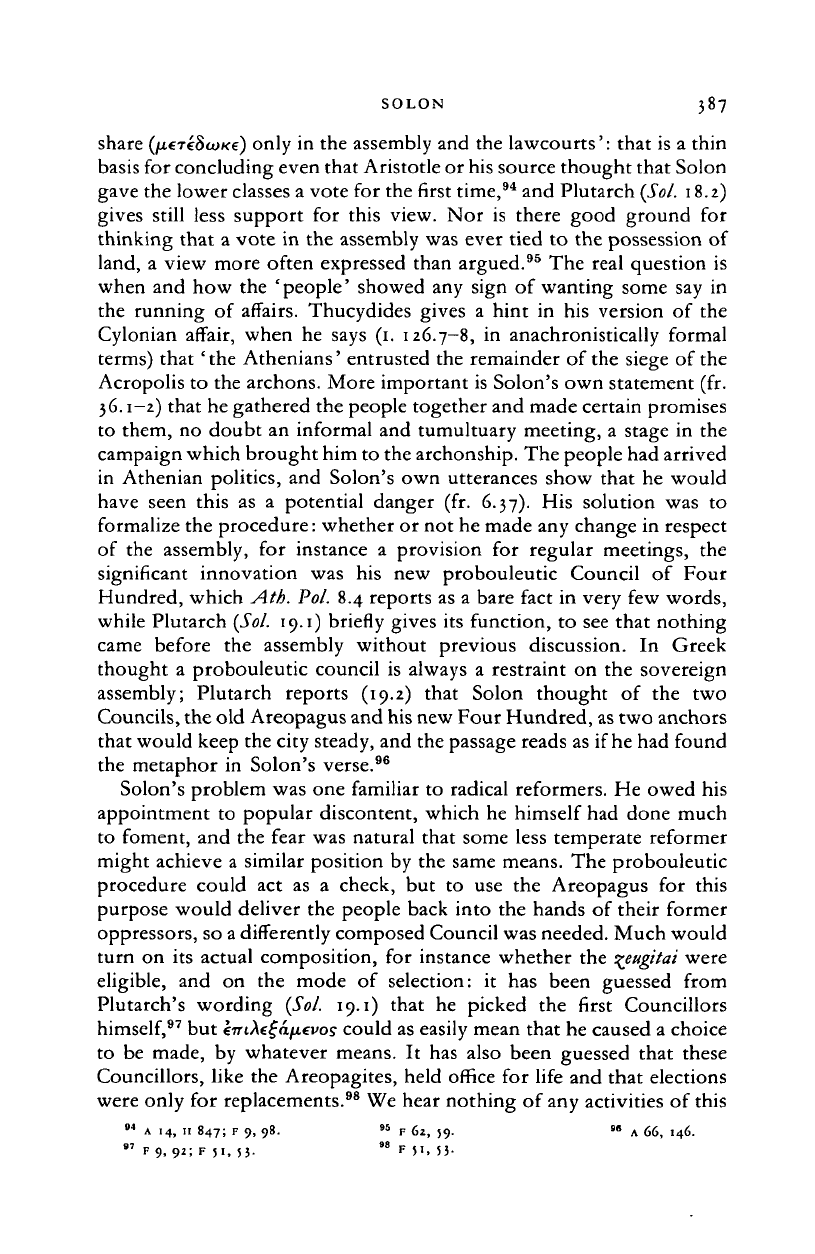
SOLON 387
share
(fiereScoKe)
only in the assembly and the lawcourts': that is a thin
basis for concluding even that Aristotle or his source thought that Solon
gave the lower classes a vote for the first time,
94
and Plutarch
{Sol.
18.2)
gives still less support for this view. Nor is there good ground for
thinking that a vote in the assembly was ever tied to the possession of
land, a view more often expressed than argued.
95
The real question is
when and how the ' people' showed any sign of wanting some say in
the running of affairs. Thucydides gives a hint in his version of the
Cylonian affair, when he says (1. 126.7-8, in anachronistically formal
terms) that 'the Athenians' entrusted the remainder of the siege of the
Acropolis to the archons. More important is Solon's own statement (fr.
36.1-2) that he gathered the people together and made certain promises
to them, no doubt an informal and tumultuary meeting, a stage in the
campaign which brought him to the archonship. The people had arrived
in Athenian politics, and Solon's own utterances show that he would
have seen this as a potential danger (fr. 6.37). His solution was to
formalize the procedure: whether or not he made any change in respect
of the assembly, for instance a provision for regular meetings, the
significant innovation was his new probouleutic Council of Four
Hundred, which Ath. Pol. 8.4 reports as a bare fact in very few words,
while Plutarch
(Sol.
19.1) briefly gives its function, to see that nothing
came before the assembly without previous discussion. In Greek
thought a probouleutic council is always a restraint on the sovereign
assembly; Plutarch reports (19.2) that Solon thought of the two
Councils, the old Areopagus and his new Four Hundred, as two anchors
that would keep the city steady, and the passage reads as if
he
had found
the metaphor in Solon's verse.
96
Solon's problem was one familiar to radical reformers. He owed his
appointment to popular discontent, which he himself had done much
to foment, and the fear was natural that some less temperate reformer
might achieve a similar position by the same means. The probouleutic
procedure could act as a check, but to use the Areopagus for this
purpose would deliver the people back into the hands of their former
oppressors, so
a
differently composed Council was needed. Much would
turn on its actual composition, for instance whether the
^eugitai
were
eligible, and on the mode of selection: it has been guessed from
Plutarch's wording (Sol. 19.1) that he picked the first Councillors
himself,
97
but
€Tn\e£afievos
could as easily mean that he caused a choice
to be made, by whatever means. It has also been guessed that these
Councillors, like the Areopagites, held office for life and that elections
were only for replacements.
98
We hear nothing of any activities of this
84
A 14, 11 847; F 9, 98. »
5
F 62, S9.
"
A
66, 146.
97
F 9,
92;
F
JI, 53.
Cambridge Histories Online © Cambridge University Press, 2008
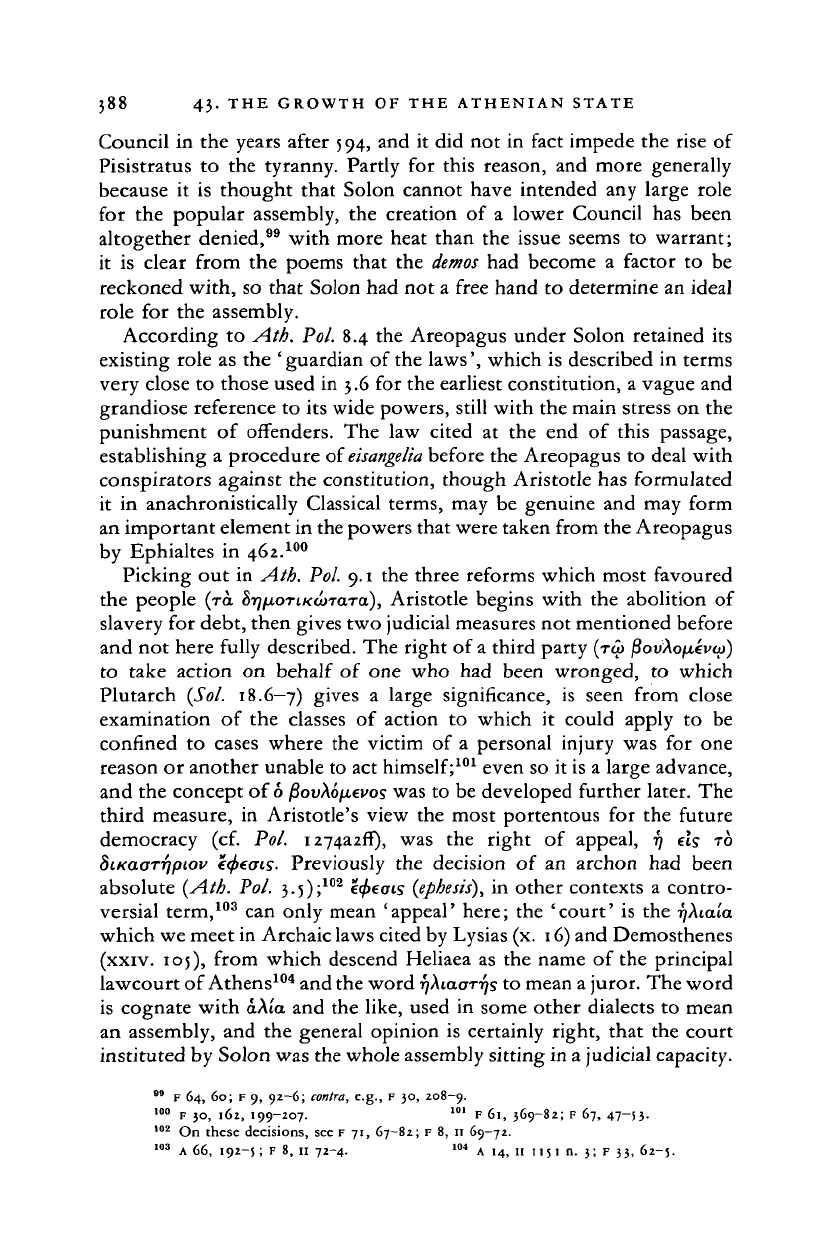
588 43-
THE
GROWTH OF THE ATHENIAN STATE
Council
in the
years after
5
94,
and it did not in
fact impede
the
rise
of
Pisistratus
to the
tyranny. Partly
for
this reason,
and
more generally
because
it
is
thought that Solon cannot have intended
any
large role
for
the
popular assembly,
the
creation
of a
lower Council
has
been
altogether denied," with more heat than
the
issue seems
to
warrant;
it
is
clear from
the
poems that
the
demos
had
become
a
factor
to be
reckoned with,
so
that Solon had not
a
free hand
to
determine
an
ideal
role
for the
assembly.
According
to Ath.
Pol.
8.4 the
Areopagus under Solon retained
its
existing role
as the
'guardian
of
the laws', which
is
described
in
terms
very close
to
those used
in 3.6 for
the earliest constitution, a vague and
grandiose reference
to
its wide powers, still with the main stress
on the
punishment
of
offenders.
The law
cited
at
the end of
this passage,
establishing
a
procedure of
eisangelia
before the Areopagus
to
deal with
conspirators against
the
constitution, though Aristotle has formulated
it
in
anachronistically Classical terms,
may be
genuine
and may
form
an important element in the powers that were taken from the Areopagus
by Ephialtes
in
462.
10
°
Picking
out in Ath.
Pol.
9.1 the
three reforms which most favoured
the people
(ra
Siy/zon/can-axa), Aristotle begins with
the
abolition
of
slavery
for
debt, then gives two judicial measures not mentioned before
and
not
here fully described. The right
of
a third party
(™
jSouAo/xevw)
to take action
on
behalf
of one who had
been wronged,
to
which
Plutarch (Sol. 18.6—7) gives
a
large significance,
is
seen from close
examination
of the
classes
of
action
to
which
it
could apply
to be
confined
to
cases where
the
victim
of a
personal injury
was for one
reason
or
another unable to act
himself;
101
even so
it
is
a
large advance,
and
the
concept
of
6 (iovAonevos
was
to
be developed further later.
The
third measure,
in
Aristotle's view
the
most portentous
for the
future
democracy
(cf.
Pol.
iz-jqaiff),
was the
right
of
appeal,
f]
els TO
8iKaoTr)piov
e<f>eai.s-
Previously
the
decision
of an
archon
had
been
absolute
(Atb.
Pol. 3.5);
102
ecfreois
(epbesis),
in
other contexts
a
contro-
versial term,
103
can
only mean 'appeal' here;
the
'court'
is the
-qXiaia
which we meet in Archaic laws cited by Lysias (x. 16) and Demosthenes
(xxiv. 105), from which descend Heliaea
as the
name
of
the principal
lawcourt of Athens
104
and the word
rjXiaaTTjs
to mean a juror. The word
is cognate with dAta
and the
like, used
in
some other dialects
to
mean
an assembly,
and the
general opinion
is
certainly right, that
the
court
instituted by Solon was the whole assembly sitting in a judicial capacity.
99
F
64, 60;
F 9,
92—6;
contra,
e.g.,
F
30,
208-9.
100
F
30, 162, 199-207.
""
F 61, 369-82; F 67, 47-53.
102
On these decisions, see F 71, 67-82; F
8,
11
69-72.
103
A
66,
192-5;
F 8,
11
72-4.
104
A 14,
11
1151
n.
3;
F
33, 62-5.
Cambridge Histories Online © Cambridge University Press, 2008
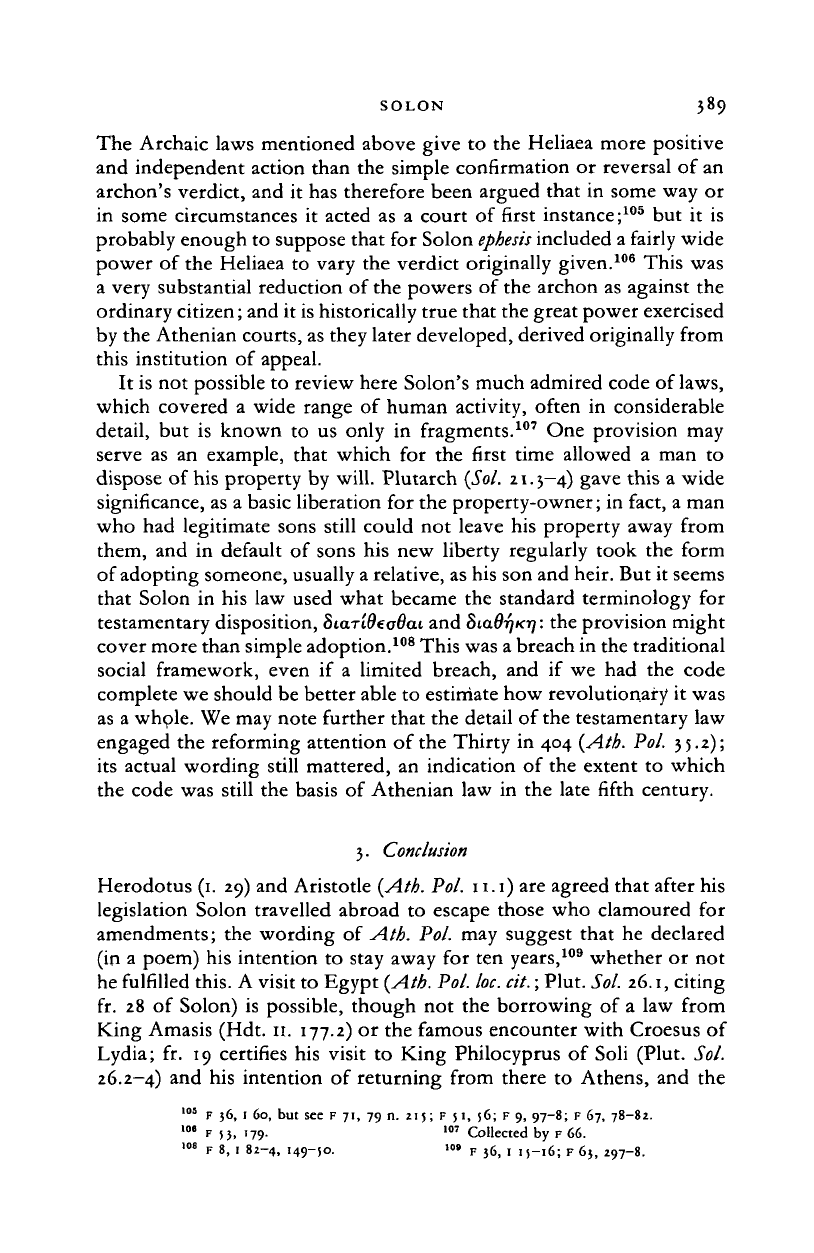
SOLON 389
The Archaic laws mentioned above give to the Heliaea more positive
and independent action than the simple confirmation or reversal of an
archon's verdict, and it has therefore been argued that in some way or
in some circumstances it acted as a court of first instance;
105
but it is
probably enough to suppose that for Solon
ephesis
included a fairly wide
power of the Heliaea to vary the verdict originally given.
106
This was
a very substantial reduction of the powers of the archon as against the
ordinary citizen; and it is historically true that the great power exercised
by the Athenian courts, as they later developed, derived originally from
this institution of appeal.
It is not possible to review here Solon's much admired code of laws,
which covered a wide range of human activity, often in considerable
detail, but is known to us only in fragments.
107
One provision may
serve as an example, that which for the first time allowed a man to
dispose of his property by will. Plutarch
{Sol.
21.3-4) gave this a wide
significance, as a basic liberation for the property-owner; in fact, a man
who had legitimate sons still could not leave his property away from
them, and in default of sons his new liberty regularly took the form
of adopting someone, usually a relative, as his son and heir. But it seems
that Solon in his law used what became the standard terminology for
testamentary disposition, Siarideadai and
SICLOTIKT):
the provision might
cover more than simple adoption.
108
This was a breach in the traditional
social framework, even if a limited breach, and if we had the code
complete we should be better able to estimate how revolutionary it was
as a whole. We may note further that the detail of the testamentary law
engaged the reforming attention of the Thirty in 404 {Ath. Pol. 35.2);
its actual wording still mattered, an indication of the extent to which
the code was still the basis of Athenian law in the late fifth century.
3.
Conclusion
Herodotus
(1.
29) and Aristotle {Ath.
Pol.
u.i) are agreed that after his
legislation Solon travelled abroad to escape those who clamoured for
amendments; the wording of Ath. Pol. may suggest that he declared
(in a poem) his intention to stay away for ten years,
109
whether or not
he fulfilled this. A visit to Egypt {Ath.
Pol.
loc.
cit.; Plut.
Sol.
26.1,
citing
fr. 28 of Solon) is possible, though not the borrowing of a law from
King Amasis (Hdt.
11.
177.2) or the famous encounter with Croesus of
Lydia; fr. 19 certifies his visit to King Philocyprus of Soli (Plut. Sol.
26.2-4) and his intention of returning from there to Athens, and the
105
F 36, 1 60, but see F 71, 79 n. 21
j;
F 51, 56; F 9, 97-8; F 67, 78-82.
106
F 5}, 179.
107
Collected by F 66.
108
F 8, 1 82-4, 149-50.
10
»
F
36, 1 15—16; F 63, 297-8.
Cambridge Histories Online © Cambridge University Press, 2008
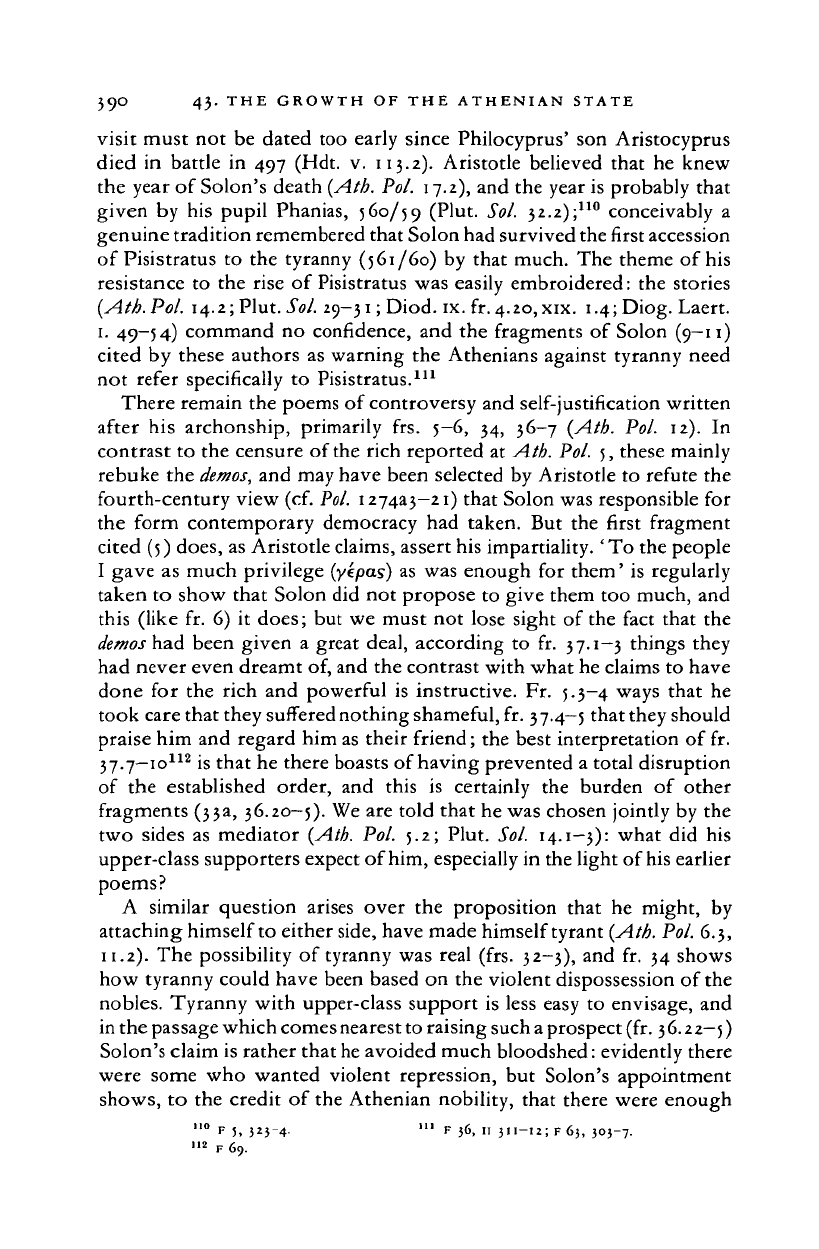
39° 43-
THE
GROWTH OF THE ATHENIAN STATE
visit must not be dated too early since Philocyprus' son Aristocyprus
died
in
battle
in
497 (Hdt.
v.
113.2). Aristotle believed that he knew
the year of Solon's death {Ath. Pol. 17.2), and the year is probably that
given
by
his pupil Phanias, 560/59 (Plut. Sol. 32.2);
110
conceivably
a
genuine tradition remembered that Solon had survived the first accession
of Pisistratus
to
the tyranny (561/60) by that much. The theme of his
resistance
to
the rise of Pisistratus was easily embroidered: the stories
(Ath.
Pol.
14.2; Plut.
Sol.
29—31;
Diod. ix. fr. 4.20, xix. i.4;Diog. Laert.
1.
49-54) command no confidence, and the fragments
of
Solon (9—11)
cited by these authors as warning the Athenians against tyranny need
not refer specifically
to
Pisistratus.
111
There remain the poems of controversy and self-justification written
after his archonship, primarily
frs.
5—6,
34,
36-7 {Ath. Pol. 12).
In
contrast to the censure of
the
rich reported at Ath. Pol. 5, these mainly
rebuke the
demos,
and may have been selected by Aristotle to refute the
fourth-century view (cf.
Pol.
12J4&5—11)
that Solon was responsible for
the form contemporary democracy had taken. But the first fragment
cited (5) does, as Aristotle claims, assert his impartiality. 'To the people
I gave as much privilege (yepas) as was enough for them' is regularly
taken to show that Solon did not propose to give them too much, and
this (like fr. 6)
it
does; but we must not lose sight of the fact that the
demos
had been given
a
great deal, according to
fr.
37.1-3 things they
had never even dreamt of, and the contrast with what he claims to have
done
for
the rich and powerful
is
instructive. Fr. 5.3-4 ways that
he
took care that they suffered nothing shameful, fr.
3
7.4—5
that they should
praise him and regard him as their friend; the best interpretation of fr.
37.7—1 o
112
is that he there boasts of having prevented a total disruption
of
the
established order, and this
is
certainly
the
burden
of
other
fragments (33a, 36.20—5). We are told that he was chosen jointly by the
two sides as mediator (Ath. Pol. 5.2; Plut. Sol. 14.1—3): what did his
upper-class supporters expect of him, especially in the light of
his
earlier
poems?
A similar question arises over the proposition that
he
might,
by
attaching himself to either side, have made himself tyrant (Ath.
Pol.
6.3,
11.2).
The possibility of tyranny was real (frs. 32-3), and
fr.
34 shows
how tyranny could have been based on the violent dispossession of the
nobles. Tyranny with upper-class support is less easy to envisage, and
in the passage which comes nearest to raising such
a
prospect (fr.
3
6.22-5)
Solon's claim is rather that he avoided much bloodshed: evidently there
were some who wanted violent repression,
but
Solon's appointment
shows, to the credit
of
the Athenian nobility, that there were enough
110
F 5,
325-4-
'" F
36,
II
311-12; F 63, 303-7.
112
F
69.
Cambridge Histories Online © Cambridge University Press, 2008
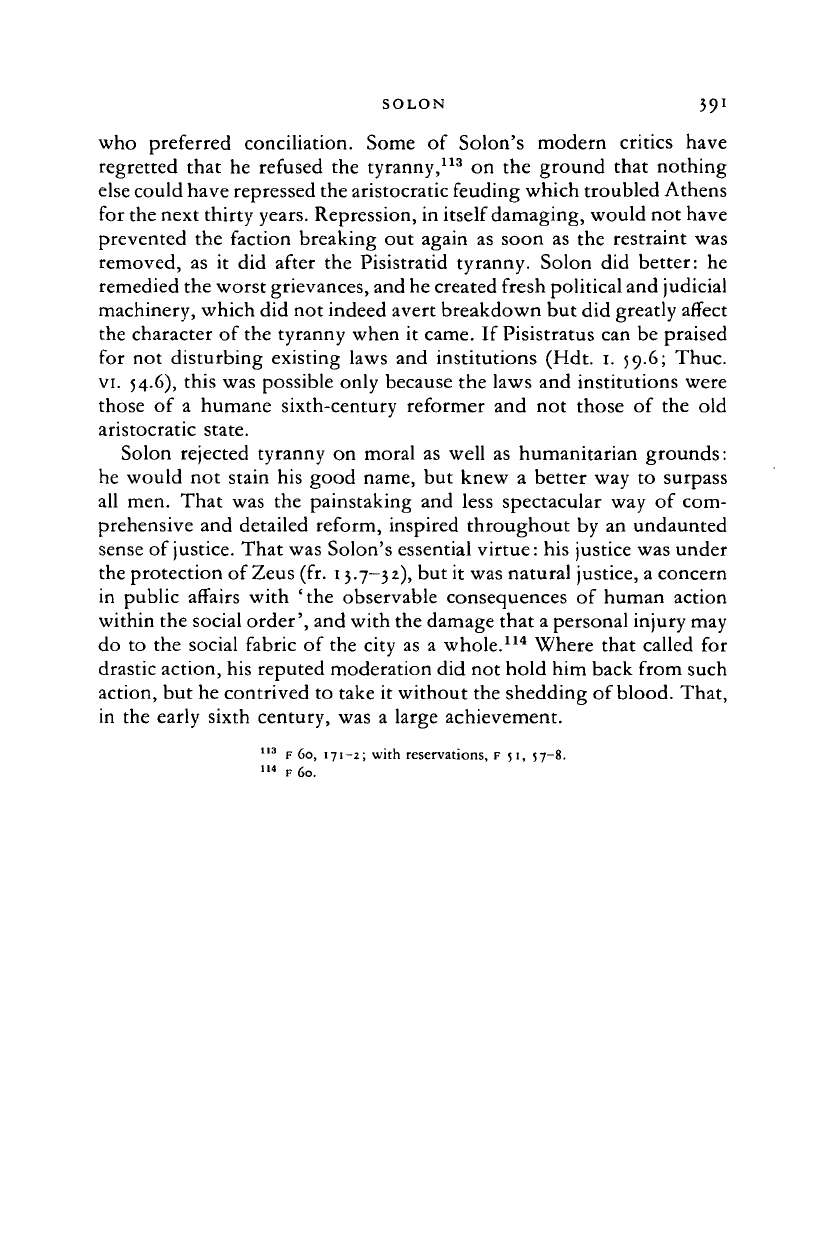
SOLON 391
who preferred conciliation. Some of Solon's modern critics have
regretted that he refused the tyranny,
113
on the ground that nothing
else could have repressed the aristocratic feuding which troubled Athens
for the next thirty years. Repression, in itself damaging, would not have
prevented the faction breaking out again as soon as the restraint was
removed, as it did after the Pisistratid tyranny. Solon did better: he
remedied the worst grievances, and he created fresh political and judicial
machinery, which did not indeed avert breakdown but did greatly affect
the character of the tyranny when it came. If Pisistratus can be praised
for not disturbing existing laws and institutions (Hdt. 1. 59.6; Thuc.
vi.
54-6)> this was possible only because the laws and institutions were
those of a humane sixth-century reformer and not those of the old
aristocratic state.
Solon rejected tyranny on moral as well as humanitarian grounds:
he would not stain his good name, but knew a better way to surpass
all men. That was the painstaking and less spectacular way of com-
prehensive and detailed reform, inspired throughout by an undaunted
sense of
justice.
That was Solon's essential virtue: his justice was under
the protection of Zeus (fr. 13.7-32), but it was natural justice, a concern
in public affairs with 'the observable consequences of human action
within the social order', and with the damage that a personal injury may
do to the social fabric of the city as a whole.
114
Where that called for
drastic action, his reputed moderation did not hold him back from such
action, but he contrived to take it without the shedding of blood. That,
in the early sixth century, was a large achievement.
113
F 60, 171-2; with reservations, F 51, 57-8.
114
F 60.
Cambridge Histories Online © Cambridge University Press, 2008
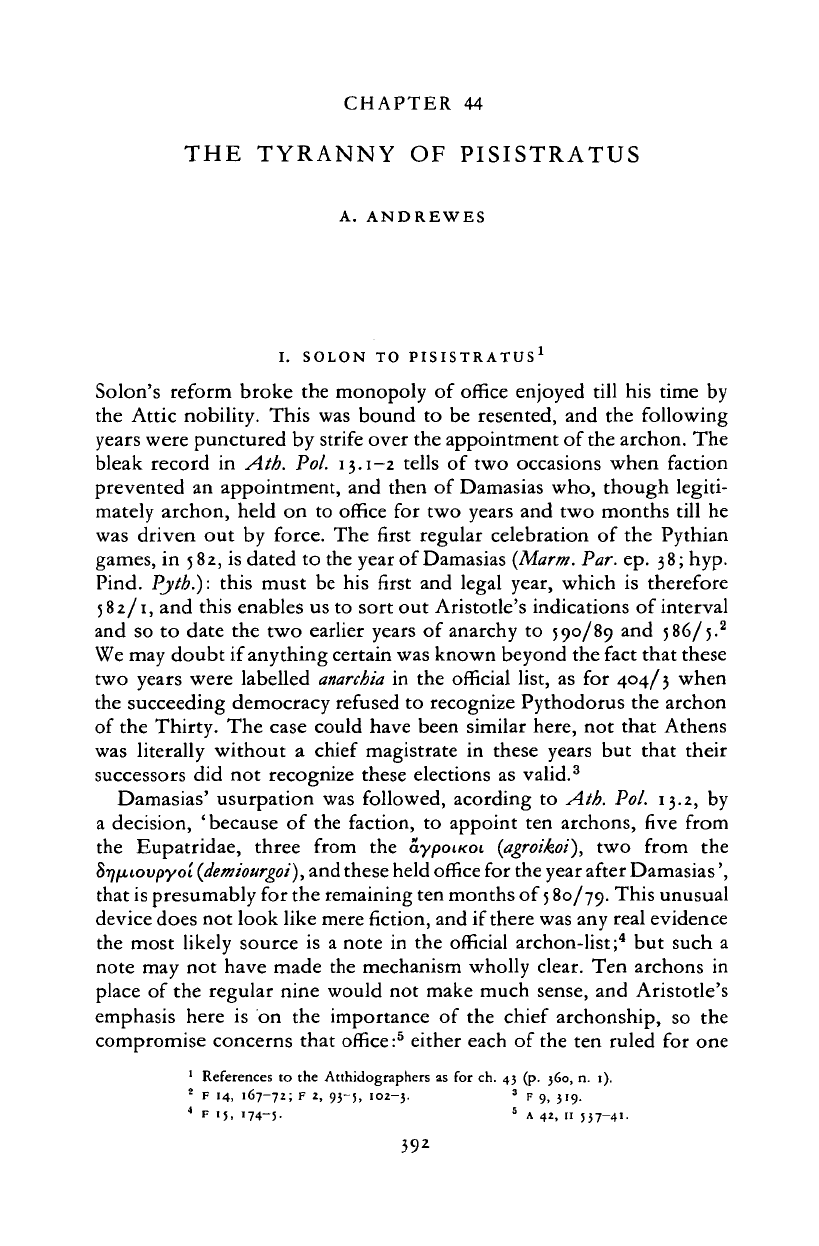
CHAPTER
44
THE
TYRANNY OF PISISTRATUS
A.
ANDREWES
I. SOLON TO PISISTRATUS
1
Solon's reform broke the monopoly
of
office enjoyed till his time
by
the Attic nobility. This was bound
to be
resented, and the following
years were punctured by strife over the appointment of
the
archon. The
bleak record
in
A.th. Pol. 13.1—2 tells
of
two occasions when faction
prevented
an
appointment, and then
of
Damasias who, though legiti-
mately archon, held
on
to office
for
two years and two months till
he
was driven
out by
force. The first regular celebration
of
the Pythian
games, in
5
82,
is dated to the year of Damasias
(Marm.
Par. ep. 38; hyp.
Pind. Pytb.): this must
be
his first and legal year, which
is
therefore
582/1,
and this enables us to sort out Aristotle's indications of interval
and so
to
date the two earlier years
of
anarchy
to
590/89 and
5
86/
5 -
2
We may doubt if anything certain was known beyond the fact that these
two years were labelled
anarchia
in the official list,
as for
404/3 when
the succeeding democracy refused to recognize Pythodorus the archon
of the Thirty. The case could have been similar here, not that Athens
was literally without
a
chief magistrate
in
these years
but
that their
successors did not recognize these elections as valid.
3
Damasias' usurpation was followed, acording
to
A.th. Pol. 13.2,
by
a decision, ' because
of
the faction,
to
appoint ten archons, five from
the Eupatridae, three from
the
aypoiKoi (agroikot),
two
from
the
8rjfj.iovpyoi
(demiourgoi),
and these held office for the year after Damasias',
that is presumably for the remaining ten months of
5
80/79.
This unusual
device does not look like mere fiction, and if there was any real evidence
the most likely source
is
a note
in
the official archon-list;
4
but
such
a
note may not have made the mechanism wholly clear. Ten archons
in
place
of
the regular nine would not make much sense, and Aristotle's
emphasis here
is on the
importance
of
the chief archonship,
so the
compromise concerns that office:
5
either each
of
the ten ruled
for
one
1
References
to
the Atthidographers as
for
ch. 43 (p. 360, n.
1).
2
F 14,
167-72;
F 2,
93-;, 102-3.
3 F
9.
3>9-
4
F '5.
>74-5-
392
Cambridge Histories Online © Cambridge University Press, 2008
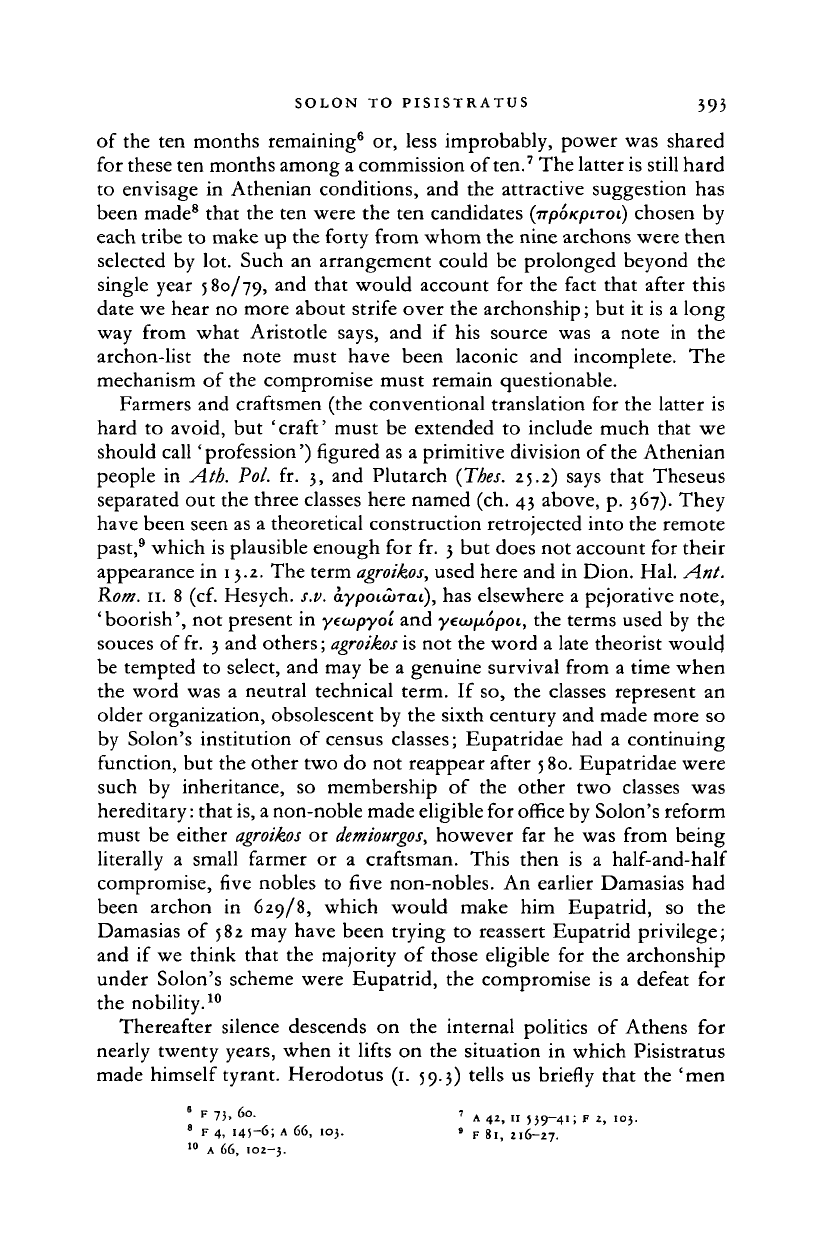
SOLON TO PISISTRATUS 393
of the ten months remaining
6
or, less improbably, power was shared
for these ten months among a commission often.
7
The latter is still hard
to envisage in Athenian conditions, and the attractive suggestion has
been made
8
that the ten were the ten candidates
(TrpoKpiroi)
chosen by
each tribe to make up the forty from whom the nine archons were then
selected by lot. Such an arrangement could be prolonged beyond the
single year 580/79, and that would account for the fact that after this
date we hear no more about strife over the archonship; but it is a long
way from what Aristotle says, and
if
his source was
a
note
in
the
archon-list the note must have been laconic and incomplete. The
mechanism of the compromise must remain questionable.
Farmers and craftsmen (the conventional translation for the latter is
hard to avoid, but 'craft' must be extended to include much that we
should call 'profession') figured as a primitive division of the Athenian
people in Ath. Pol. fr. 3, and Plutarch (Thes. 25.2) says that Theseus
separated out the three classes here named (ch. 43 above, p. 367). They
have been seen as a theoretical construction retrojected into the remote
past,
9
which is plausible enough for fr.
3
but does not account for their
appearance in 13.2. The term
agroikos,
used here and in Dion. Hal. Ant.
Rom.
11.
8 (cf. Hesych. s.v. aypoiuirai), has elsewhere a pejorative note,
'boorish', not present in
yecopyoi
and
yeoufiopoi,
the terms used by the
souces of fr.
3
and others;
agroikos
is not the word a late theorist would
be tempted to select, and may be a genuine survival from a time when
the word was a neutral technical term. If so, the classes represent an
older organization, obsolescent by the sixth century and made more so
by Solon's institution of census classes; Eupatridae had a continuing
function, but the other two do not reappear after
5
80.
Eupatridae were
such by inheritance,
so
membership
of
the other two classes was
hereditary: that
is,
a
non-noble made eligible for office by Solon's reform
must be either
agroikos
or
demiourgos,
however far he was from being
literally
a
small farmer or
a
craftsman. This then
is a
half-and-half
compromise, five nobles to five non-nobles. An earlier Damasias had
been archon
in
629/8, which would make him Eupatrid,
so the
Damasias of 582 may have been trying to reassert Eupatrid privilege;
and if we think that the majority of those eligible for the archonship
under Solon's scheme were Eupatrid, the compromise is a defeat for
the nobility.
10
Thereafter silence descends on the internal politics of Athens for
nearly twenty years, when it lifts on the situation in which Pisistratus
made himself tyrant. Herodotus (1. 59.3) tells us briefly that the 'men
F
73> ""•
'
A 42, 11 539-41; F 2, 103.
8
F 4, 145-6; A 66, 103.
»
F
81, 216-27.
10
A 66, 102-3.
Cambridge Histories Online © Cambridge University Press, 2008
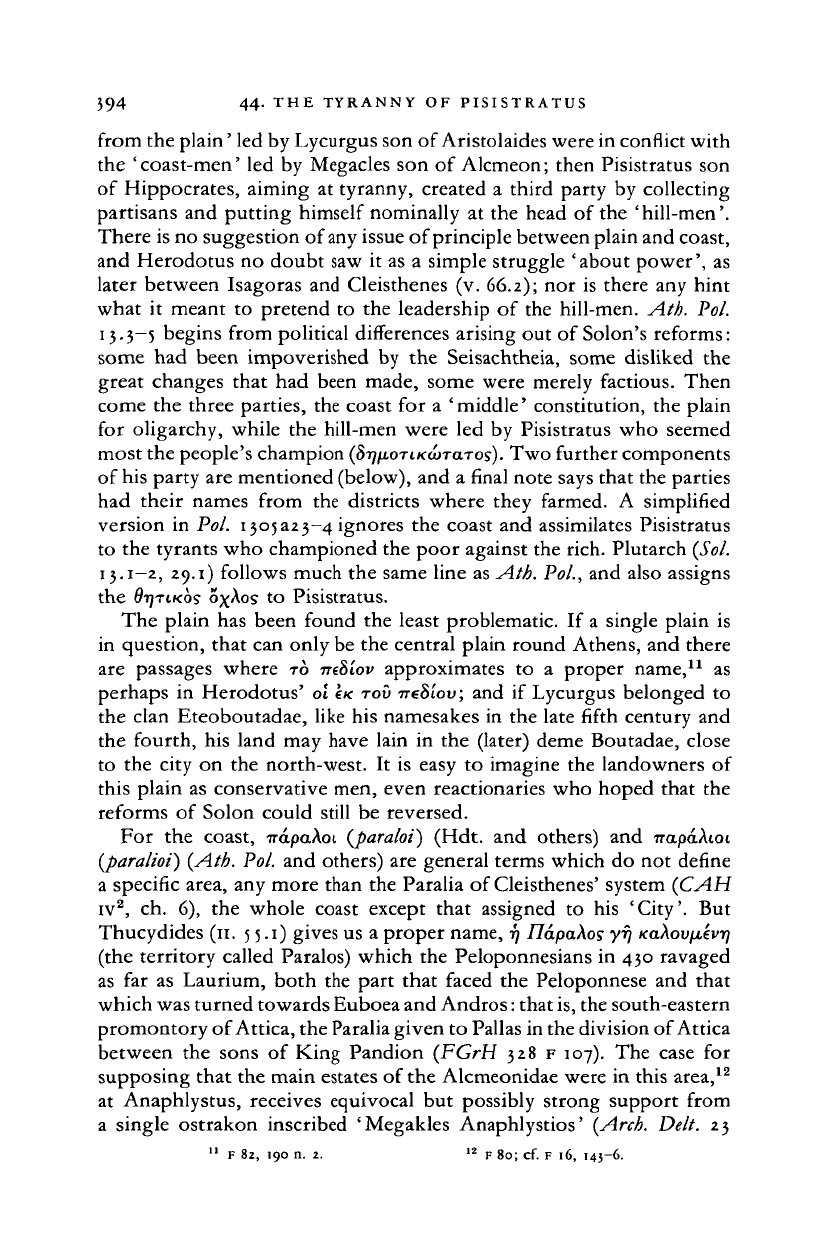
394 44- THE TYRANNY OF PISISTRATUS
from the plain' led by Lycurgus son of Aristolaides were in conflict with
the 'coast-men' led by Megacles son
of
Alcmeon; then Pisistratus son
of Hippocrates, aiming at tyranny, created
a
third party by collecting
partisans and putting himself nominally at the head of the 'hill-men'.
There is no suggestion of any issue of principle between plain and coast,
and Herodotus no doubt saw
it
as
a
simple struggle 'about power', as
later between Isagoras and Cleisthenes (v. 66.2); nor is there any hint
what
it
meant
to
pretend to the leadership
of
the hill-men.
Ath.
Pol.
13.3-5 begins from political differences arising out of Solon's reforms:
some had been impoverished
by
the Seisachtheia, some disliked
the
great changes that had been made, some were merely factious. Then
come the three parties, the coast for a ' middle' constitution, the plain
for oligarchy, while the hill-men were led by Pisistratus who seemed
most the people's champion
(8-qfj.oTiKCjTaTos).
Two further components
of his party are mentioned (below), and a final note says that the parties
had their names from the districts where they farmed.
A
simplified
version
in
Pol. 1305323—4 ignores the coast and assimilates Pisistratus
to the tyrants who championed the poor against the rich. Plutarch
{Sol.
13.1—2,
29.1) follows much the same line as Ath. Pol., and also assigns
the
OrjriKos
ox^os
to
Pisistratus.
The plain has been found the least problematic.
If
a single plain
is
in question, that can only be the central plain round Athens, and there
are passages where TO TreSiov approximates
to a
proper name,
11
as
perhaps
in
Herodotus'
01
IK
TOV
neSlov; and
if
Lycurgus belonged
to
the clan Eteoboutadae, like his namesakes in the late fifth century and
the fourth, his land may have lain
in
the (later) deme Boutadae, close
to the city on the north-west.
It
is easy
to
imagine the landowners of
this plain as conservative men, even reactionaries who hoped that the
reforms
of
Solon could still be reversed.
For
the
coast, ndpaXoi (paraloi) (Hdt.
and
others)
and
napaXioi
{paraliot)
{Ath. Pol. and others) are general terms which do not define
a specific area, any more than the Paralia of Cleisthenes' system {CAH
iv
2
,
ch. 6), the
whole coast except that assigned
to his
'City'.
But
Thucydides
(11.
55.1) gives us a proper name,
r/
FlapaXos
yf)
KaXovfxevrj
(the territory called Paralos) which the Peloponnesians in 430 ravaged
as
far
as Laurium, both the part that faced the Peloponnese and that
which was turned towards Euboea and Andros: that
is,
the south-eastern
promontory of Attica, the Paralia given to Pallas in the division of Attica
between the sons
of
King Pandion {FGrH 328 F 107). The case
for
supposing that the main estates of the Alcmeonidae were in this area,
12
at Anaphlystus, receives equivocal but possibly strong support from
a single ostrakon inscribed 'Megakles Anaphlystios' {Arch. Delt.
23
11
F
82, 190
n. 2.
12
F 80;
cf. F 16,
145-6.
Cambridge Histories Online © Cambridge University Press, 2008
